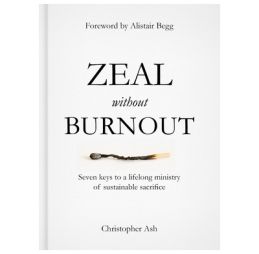Zeal Without Burnout by Christopher Ash – A Review

A recent survey of the working patterns and stress levels among almost 500 pastors, church-based women’s workers, and youth and children’s workers revealed some concerning results:
- The average respondent was doing double the number of hours they are “officially” supposed to;
- Almost half were not taking a regular weekly day off;
- One third had experienced burnout;
- 15% were working over 70 hours a week;
- And yet 80% felt guilty they were letting people down by not doing a good job.

That makes a book like Zeal without Burnout: Seven keys to a lifelong ministry of sustainable sacrifice very significant. To put it another way, we need it. (Or at least we need someone to speak into our lives on this matter). And author Christopher Ash is certainly not writing as an armchair observer. As a pastor himself, as well as the former director of the popular ministry training course, Cornhill, Christopher testifies to twice having come to the edge of burnout, requiring significant time-off and recuperation. In that sense, it reads as the book he wishes someone had placed into his own hands.
The essence of ZWB is an extended reminder that we are creatures of dust, something that Christopher believes is “a neglected truth”:
When you and I surrendered to Jesus as Lord, we did not offer him the services of a divine, or even semi-divine creature, to strengthen his kingdom; we offered him the fragile, temporary, mortal, frail life that he has first given to us. That is all we have to offer… God knows that: “for he knows our frame; he remembers that we are dust.” (Psalm 103 v14)
Part of this is the recovery of the realisation that we are embodied creatures. We can’t separate our ‘spiritual lives’ from our bodily lives. In other words, we can’t expect to keep operating in ministerial roles without giving attention to the way we’re made. And so Christopher gives a chapter each to four essentials: sleep; Sabbath rests; friends; and inward renewal. Even reading those as a list, the temptation is to flick past them as if they are too obvious, or even – dare I say it – not spiritual enough. And yet Christopher says this is symptomatic of trying to be more than God made us to be. These are the means God has given to sustain his creatures. Quoting the renowned Scottish minister William Still, we need to: “Know our limits… Most people crack up because they try to do what God never intended.”
Of course this also relates to our motivations in ministry and how we perceive our own identity in our role and ‘success’. Christopher takes time to lovingly but powerfully expose “ministry machismo,” overworking because of a desire to try and do everything – whether that’s because we’re trying to carve out a reputation for ourselves, or trying to prove ourselves. He also acknowledges that the ‘best of intentions’ often lead to a passion for ministry that can increasingly make unwise decisions. Sometimes it might be the congregation who we have in mind, sometimes it’s those in responsibility above us, or sometimes its a side-eye on the minister down the road. But they can all be dangerous.
I think too, in the social media age, we can all be very aware of what our ‘ministry peers’ are upto. We read the tweets (and retweets) and we see the Facebook posts. Conferences and catch-ups can become comparison stations. When folk are held up to us as leading names and exemplars in online articles and web-profiles it often leads to us measuring our own status by the level of public recognition we can or can’t achieve. Instead we need to learn something hugely counter-cultural: to “rest content in our creaturely weakness”.

One of the commendations on the back describes Christopher’s tone as “humane,” which I first thought to be an unusual term but having read the book I completely agree. Christopher writes with understanding. He understands ministry and he understands the desires and temptations ministers face and he understands the reality of burnout. To put it more precisely, he understands that serving God will bring a cost. Throughout it he commends hard work and sacrifice. And yet he also understands the temptation of foolish heroism. We need to think in terms of “sustainable sacrifice”:
“The sort of self-giving living that God enables us to go on giving day after day.”
Of course, this isn’t just for our own well-being. It’s also acknowledging the reality that a ministry crash impacts upon others too: perhaps a spouse, children, colleagues, and of course the church itself.
As someone with a few years of full-time ministry pre-college under my belt, and now looking ahead to a longer stint ‘out in the field’ post-college, Christopher’s book is a bit of a wake-up call. As well as the author’s own two experiences of burnout, the book is littered with excerpts from correspondence and conversations from others who have been through similar ‘crashes’ and ‘troughs’, many with accompanying medical implications to some degree. There are also extended testimonies placed as ‘intervals’ in between chapters, with named individuals choosing to be very honest about their own experiences. All of these help underline a very persuasive message: ‘don’t think you’re beyond this, we weren’t’.
A final post-script chapter form Dr Steve Midgley, a trained psychiatrist, pastor, and head of Biblical Counselling UK/lecturer in biblical counselling at Oak Hill College, offers a helpful angle on what’s going on with burnout medically-speaking. He also gives the important reminder that:
“Burnout isn’t the worst thing that can happen. In fact, it may sometimes be the very thing God uses to challenge us about the need for spiritual growth and change.”
Obviously the nature of the subject means the real fruit of such a book cannot be judged in the short-term. That said, an immediate response must be to look at our own patterns of living and, as Christopher puts it, “to be prepared to be very firm in changing your lifestyle and patterns of Christian service, even if it is hard.”
As I close, here are a handful of lines that particularly stuck out:
“To neglect sleep, Sabbaths, friendships and inward renewal is not heroism but hubris.”
“Like the manna in the wilderness, rest is an exercise in trust.”
“The aim of gospel work is not to be a lone hero, but to work with other gospel workers to spread the gospel of Jesus.”
“A wise measure of self-preservation and the drawing of boundaries around our time is not the denial of love, but the outworking of wisdom.”
“It makes sense to give others permission to tell us when they notice signs that we are under pressure.”
Lastly, although the saying goes, ‘don’t judge a book by its cover,’ inevitably a book’s cover and packaging do effect its first impression. In that regard, hats off to The Good Book Company for its presentation of ZWB. The small hardback format (akin to C.J. Mahaney’s Humility or The Cross-Centred Life, if you’ve seen those) and the pleasant formatting make it a delight to read, which given the topic is just as well.
Pick up a copy of Zeal without Burnout from the publisher here. There’s also the reduced offer of a ‘ministry pack‘ with five copies for only £25, with the intention of allowing a staff team or fraternal to read through the book together.
You can also watch the trailer below:
Full disclosure: The publisher sent me a copy of the book for free, but I hope this is still a fair and honest review!